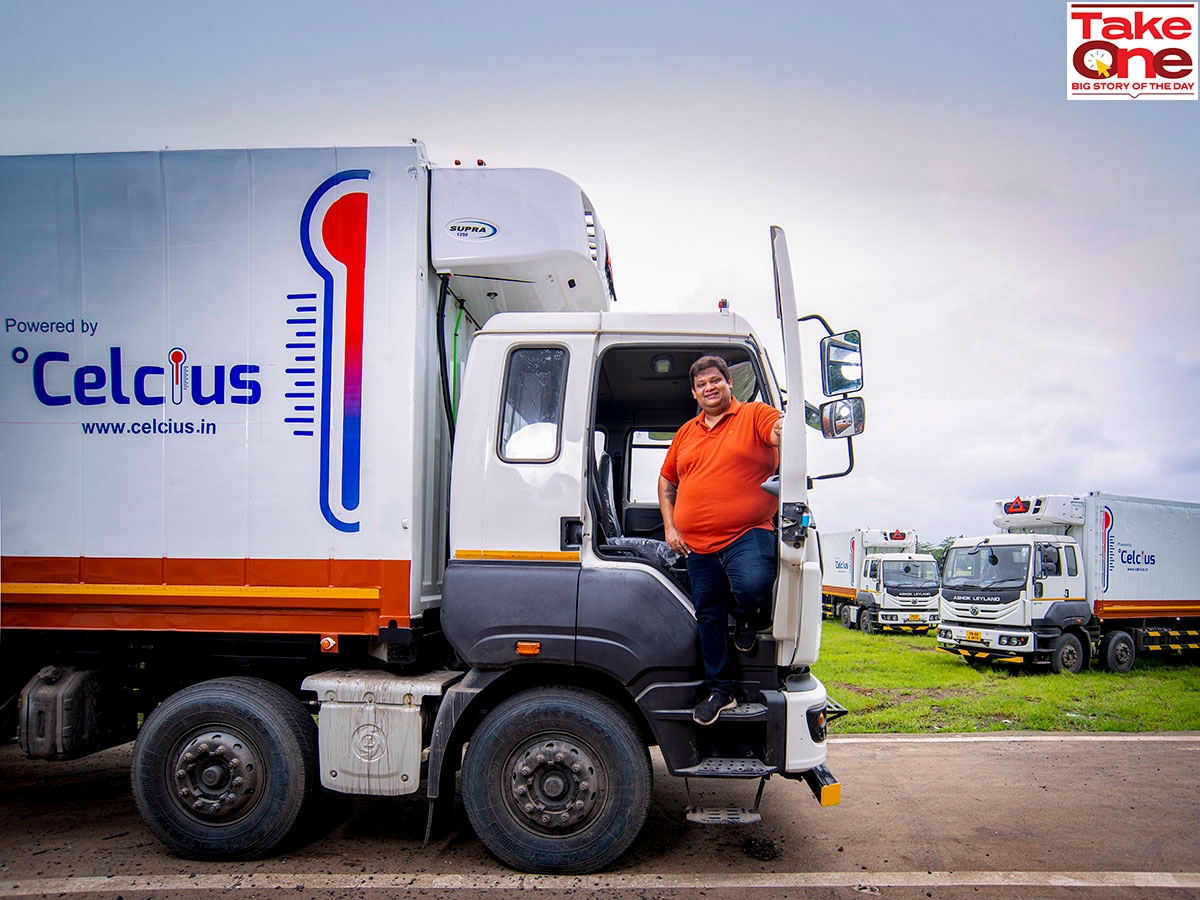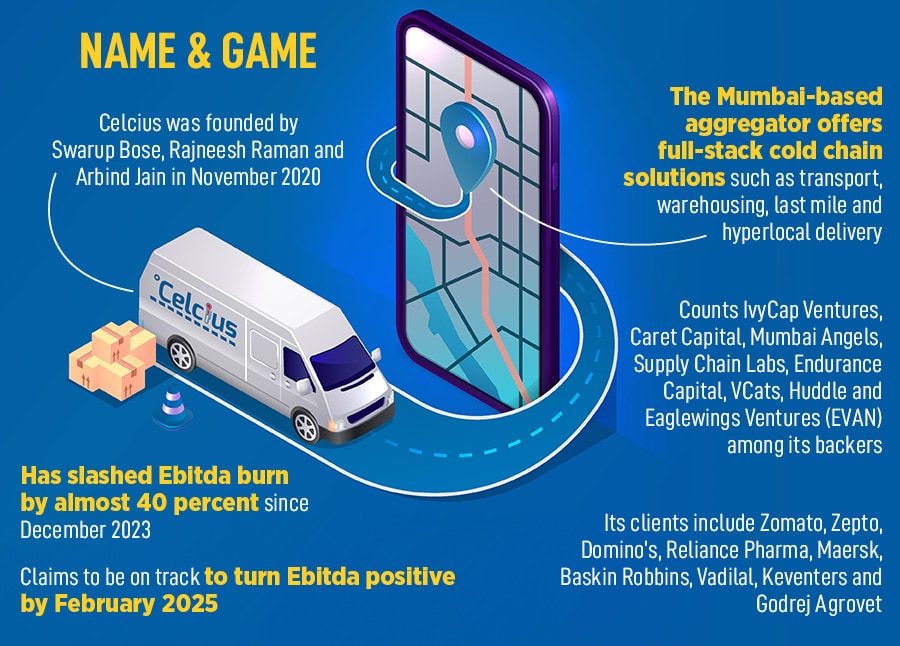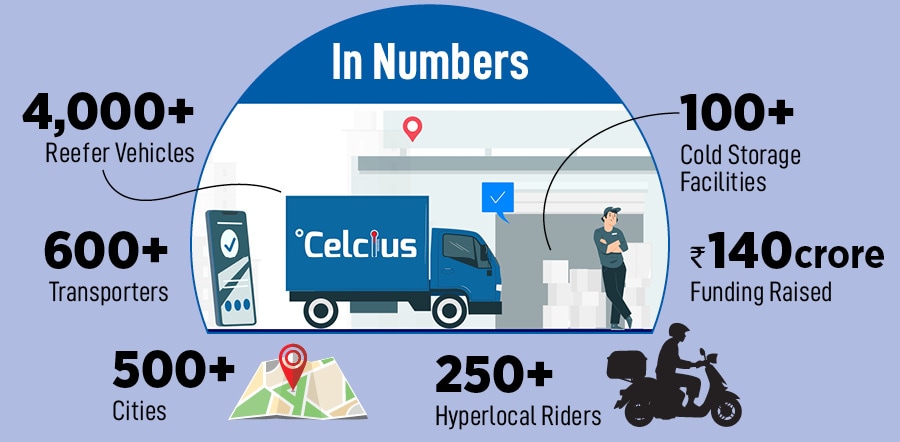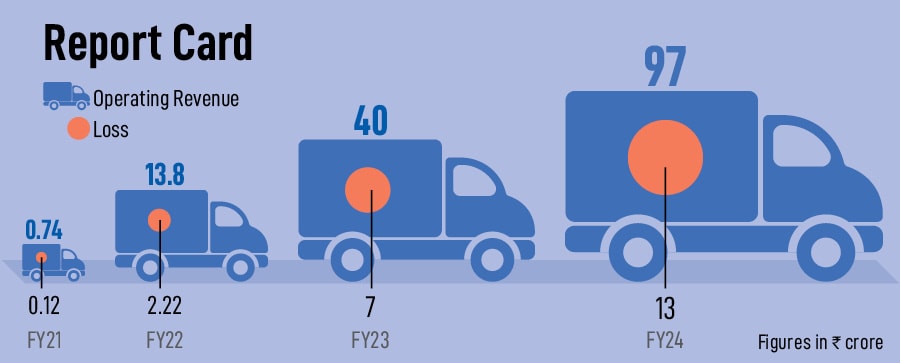 Swarup Bose, Founder & CEO, Celcius Logistics.
Swarup Bose, Founder & CEO, Celcius Logistics.
Image: Bajirao Pawar for Forbes India.
Swarup Bose was no stranger to a chilling reality. In the cold chain business—so goes the irrefutable truth—there is no place for the ones breaking out in a cold sweat. Ironically, a veteran like Bose, who has had over a decade-and-a-half stint in cold chain logistics, was getting fidgety. The 39-year-old was trying his best to mask an uneasy calm. “I had put everything at stake. What I did was not a plain-vanilla risk,” recalls Bose, who started his third venture, Celcius, during the peak of the pandemic in 2020.
The cold-blooded move, interestingly, defied logic. Bose roped in two of his friends, ploughed his savings—Rs50 lakh—and went against the warning and wisdom of his father, his business partner in the first venture of manufacturing cold storage panels for refrigerated vehicles which the duo rolled out in 2004. “I hope you know what you are doing,” his father tried to instill some realism into his son’s maverick business plan. What alarmed the senior professional was the muted success of the first venture which ran for 18 years and a devastating loss in the second venture. In 2015, Bose bought 25 refrigerated vehicles, spotted a yawning gap in cold chain supply, and morphed into a transporter.
The gambit bombed. The loss-making venture ran for three years and shuttered in 2018. Two years later, the legacy manufacturing business too went out of operation due to the pandemic lockdown. “Why are you getting into cold chain again?” an anxious father was trying to make sense of a blatantly implausible move. “You are 39, dipping into all your savings, and have badly timed your new innings,” his father pointed out all the possible red flags. The son, though, was adamant. The cold supply-chain segment, he argued, was broken and badly needed a tech makeover. The country, Bose reckoned, needed a tech platform where the cold supply chain could converge, interact, track, trace, and use IoT (Internet of Things) devices. “Celcius is the answer,” he maintained and rolled out the venture amid a raging pandemic in August 2020.

Four months into the new venture, Bose was scouring around for answers. The questions, interestingly, were tough. “Are you guys transporters or warehouse owners?” were the first questions from baffled potential users who couldn’t make any sense of the tech platform, which was pegged as India’s first cold chain marketplace. “We kept explaining that we are providing technology, and they keep insisting that they want solutions, and not technology,” recalls Bose. For the first five months, Celcius didn’t make a single rupee.

A third venture, no takers, no business, and fast running out of cash… Bose was on a sticky wicket. “The first few months were a disaster,” he recounts, adding that the customers wanted a full-stack model—providing transport, monitoring, understanding the data, and delivering—and not just a tech platform. In January 2021, Celcius bagged its maiden order. For the next few months, orders kept trickling. The next big challenge came when the fledgling startup stepped out to raise venture capital.
Also read: Allcargo: Proving its mettle in a tough business
With a bootstrapped background, Bose developed cold feet. The acceptable lingo of the startup world such as MRR (monthly recurring rate), ARR (annual recurring run rate), pitch deck, and go-to-market strategies was missing from Bose’s dictionary. The venture capitalists (VCs) too couldn’t make sense of a business that didn’t have any precedent in India. “Can this business be scaled?” was the question. “Can it make money?” was another follow-up query.
What compounded the problem for Bose was the myopic view taken by the funders. The cold chain ecosystem was perceived as a negligible share of the logistics industry in India. “Why a separate platform for cold chain? Is it not done by the traditional logistics player?” were a few more questions that stumped Bose and his team. Yes, the cold chain supply ecosystem was broken. Yes, there was a pressing need to fix it and make it more efficient by using technology. But Bose didn’t have answers. Celcius needed to walk the talk.

The second wave of the pandemic presented that missing opportunity. Celcius bagged the contract for vaccine distribution for one of the big corporate houses. The initial task was for one week and one city. The mandate quickly expanded to 15 cities and three months. The execution of the project boosted the profile of the cold chain marketplace. Celcius was now the talk of the town. It bagged its first round of funding in June 2021, but big VCs and institutional funds still shied away from taking a bet.
A few months later, in 2022, came another tipping point. Celcius was fast running out of money, there were no new investors, and Bose had to go back to his angels such as Mumbai Angels, Supply Chain Labs, Endurance Capital, Huddle, and Eaglewings Ventures (EVAN). “They saw our numbers and doubled down on their bets,” recalls Bose, who asked for Rs10 crore but ended up with a kitty of Rs35 crore for its pre-Series A round of funding. In April 2023, Celcius raised Rs100 crore in a funding round led by IvyCap Ventures. A year later, in May 2024, the startup raised $4.8 million (around Rs40 crore) in pre-Series B funding led by Ivycap Ventures.

A steady growth in funding has aided a faster revenue uptick. Celcius’s operating revenue has jumped from Rs74 lakh in FY21 to Rs97 crore in FY24. Though losses too have increased from Rs12 lakh to Rs13 crore during the same period, Bose claims that Celsius has slashed Ebitda burn by almost 40 percent since December 2023. “We are on track to turn Ebitda positive by February 2025,” he claims, adding that the startup is now clocking a revenue run-rate of Rs175 crore. The platform, he adds, now has over 4,000 reefer vehicles, 600+ transporters, 100+ cold storage facilities, a presence across 500 cities, and over 250 hyperlocal riders. Celcius has also added new verticals such as pharma and new-age businesses and is exploring agri to beef up revenue.
The backers too are delighted with the growth chart. “It has been an exciting journey,” reckons Vikram Gupta, founder and managing partner at IvyCap Ventures. The company’s focus on transforming cold chain logistics, Gupta underlines, aligns with IvyCap’s vision of supporting disruptive businesses with high impact. “From its early days to becoming a key player in the sector with a presence across India, we have seen tremendous growth in Celcius,” he adds.

Though Celcius has grown at a brisk clip, the challenge is to grow sustainably. Bose, however, identifies a different kind of challenge for the startup: The risk-reward cycle. “When I started the business, it was a huge risk. But somewhere down the line, I became risk averse,” he confesses. In 2022, Bose reckons, the startup should have taken bolder and bigger bets. The entrepreneur’s actions were governed by the thought of ‘what if this doesn’t work’. He forgot that Celcius was born with a distinct ideology: ‘What if this works’.
But is he not driving too fast? Bose reckons he is in no mood to take his foot off the gas pedal. “I have clients, investors, revenue and a massive untapped opportunity ahead of me,” he says. “Why should I slow down?” he asks. Celcius, he maintains, will turn up the heat.
